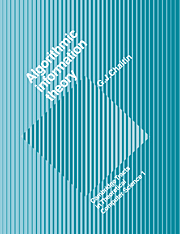Book contents
Summary
The aim of this book is to present the strongest possible version of Gödel's incompleteness theorem, using an information-theoretic approach based on the size of computer programs.
One half of the book is concerned with studying Ω, the halting probability of a universal computer if its program is chosen by tossing a coin. The other half of the book is concerned with encoding Ω as an algebraic equation in integers, a so-called exponential diophantine equation.
Gödel's original proof of his incompleteness theorem is essentially the assertion that one cannot always prove that a program will fail to halt. This is equivalent to asking whether it ever produces any output. He then converts this into an arithmetical assertion. Over the years this has been improved; it follows from the work on Hilbert's 10th problem that Godel's theorem is equivalent to the assertion that one cannot always prove that a diophantine equation has no solutions if this is the case.
In our approach to incompleteness, we shall ask whether or not a program produces an infinite amount of output rather than asking whether it produces any; this is equivalent to asking whether or not a diophantine equation has infinitely many solutions instead of asking whether or not it is solvable.
If one asks whether or not a diophantine equation has a solution for N different values of a parameter, the N different answers to this question are not independent; in fact, they are only log2N bits of information.
- Type
- Chapter
- Information
- Algorithmic Information Theory , pp. ix - xPublisher: Cambridge University PressPrint publication year: 1987



